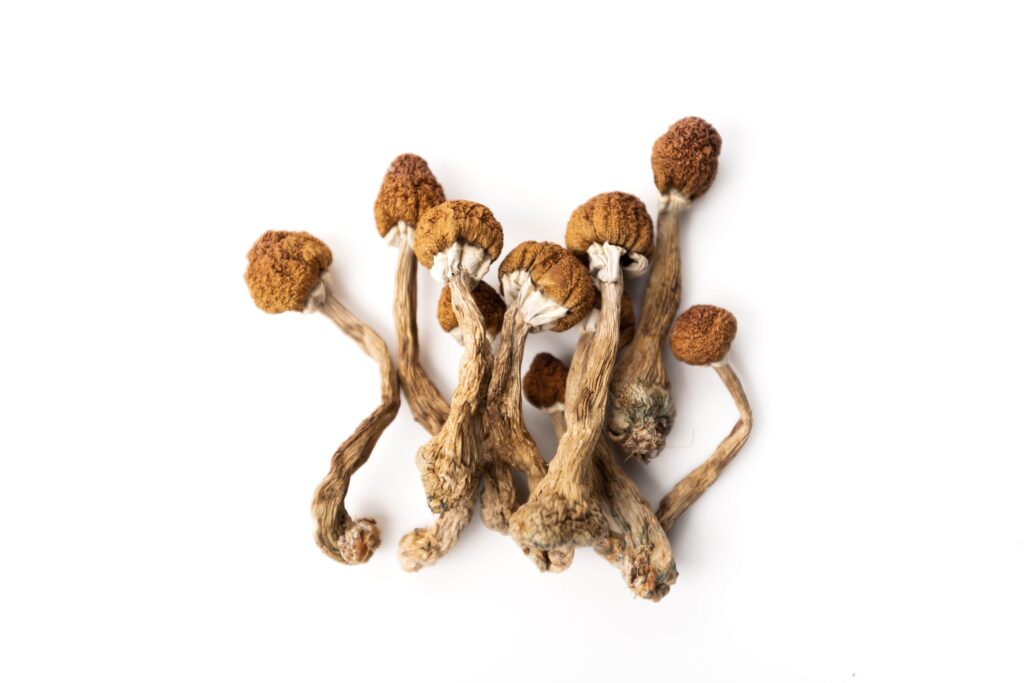Chronic pain is an emotional and psychological battle. For millions of people, the daily struggle with pain leads to anxiety, depression, and a sense of hopelessness. We’ve seen this firsthand at The Buena Vida, where many of our guests come to us not only to heal from past trauma but also to find relief from the persistent pain that has shaped their lives.
In recent years, psilocybin, the psychoactive compound in certain mushrooms, has gained mainstream attention for its ability to treat depression and anxiety.
But what if its benefits extend beyond mental health?
Can mushrooms help with pain?
Emerging research suggests that psilocybin doesn’t just dull pain like traditional painkillers, it fundamentally shifts how our brains process it. From chronic inflammation to nerve damage to the emotional weight of pain, psilocybin may offer a new way forward.
But is it a real solution or just a psychedelic illusion?
Can it work for conditions like fibromyalgia, arthritis, and post-surgical pain?
And most importantly, how can we harness its potential safely?
Let’s explore the science, the stories, and the real-world applications of psilocybin for pain relief—and why the right setting, preparation, and integration matter just as much as the medicine itself.
The Connection Between Pain and Mental Health
Chronic pain is a physical and emotional burden. Anyone who has experienced long-term pain knows that it seeps into every aspect of life, affecting mood, relationships, and even identity. When pain persists, the nervous system adapts, often heightening sensitivity and making discomfort feel even more overwhelming. It’s no surprise that conditions like fibromyalgia, migraines, and neuropathy are often accompanied by depression and anxiety.
Many of our guests at The Buena Vida have come to us not only to heal from trauma but also because traditional pain management methods have failed them. They’ve tried painkillers, physical therapy, and even alternative treatments—yet the cycle of discomfort remains. What’s becoming increasingly clear is that pain and mental health are deeply intertwined, and treating one without addressing the other is often ineffective.
Psilocybin’s Role in Treating Depression—and Pain
Photo Source -> Dr Robin Carhart-Harris, head of the Centre for Psychedelic Research at Imperial
Research on psilocybin’s effects on depression has been groundbreaking. Studies from institutions like Johns Hopkins and Imperial College London show that psilocybin can reduce depressive symptoms by “resetting” neural pathways, promoting emotional processing, and increasing cognitive flexibility. But what does this have to do with pain?
Pain is surprisingly also shaped by emotions, past trauma, and stress levels. This is why chronic pain sufferers often find that stress or anxiety makes their pain worse. Psilocybin’s ability to disrupt negative thought loops and reset the Default Mode Network (DMN) may also apply to how we perceive pain. By altering the brain’s response to discomfort, psilocybin may help individuals experience pain in a way that feels less overwhelming, even if the physical sensation remains.
Scientific Evidence Linking Psilocybin to Pain Relief
While research is still in its early stages, studies are beginning to confirm what many people have already discovered firsthand—psilocybin may offer relief from various types of chronic pain:
- A study from the University of Virginia is currently investigating psilocybin’s potential for treating chronic lower back pain, one of the most common and debilitating pain conditions.
- Research on cluster headaches, often called “suicide headaches” due to their intensity, suggests that low doses of psilocybin may reduce their frequency and severity.
- Psychedelic-assisted therapy trials indicate that psilocybin’s effects on mood disorders may also help individuals reframe their relationship with pain, reducing distress and improving quality of life.
We’ve seen guests experience profound emotional releases during their journeys, often uncovering repressed trauma that was contributing to their pain. When emotions are processed and integrated, physical pain can lessen. Could psilocybin be the missing link between chronic pain and lasting relief? The research—and the stories of those who’ve experienced it—suggest that it just might be.
How Psilocybin Affects Pain Perception

When pain becomes chronic, the nervous system adapts, reinforcing pain pathways and making discomfort feel more intense over time. This is why an injury that should have healed long ago can still hurt, and why conditions like fibromyalgia and neuropathy persist even when no obvious physical damage remains.
In simple terms, chronic pain “rewires” the brain. The neurons that fire during pain episodes become hypersensitive, and over time, pain signals can misfire even when there’s no external trigger. This is known as central sensitization, and it explains why people with chronic pain often feel trapped in a never-ending cycle.
This is where psilocybin enters the conversation. Unlike opioids, which simply numb pain signals, psilocybin may help the brain break out of these dysfunctional patterns.
Psilocybin and the Default Mode Network: A Reset Button for Pain?
One of many things I find interesting about psilocybin is its impact on the Default Mode Network (DMN)—a set of brain regions involved in self-reflection, rumination, and, importantly, pain perception. In people with chronic pain, the DMN often becomes overactive, keeping the brain stuck in negative feedback loops where pain is constantly reinforced.
Studies suggest that psilocybin temporarily disrupts the DMN, offering what some researchers call a “reset” effect. By quieting these ingrained pain-processing pathways, psilocybin may allow the brain to rewire itself, reducing the emotional and psychological distress that amplifies pain.
- Neuroplasticity and Pain Relief: Psilocybin promotes neuroplasticity—the brain’s ability to form new connections—which may help chronic pain patients develop healthier responses to discomfort.
- Breaking the Pain Cycle: Some pain specialists believe that psychedelics can help retrain the brain to interpret pain signals differently, making them less overwhelming.
- The Emotional-Pain Connection: Since the DMN is also tied to emotional processing, psilocybin’s ability to release suppressed emotions may further alleviate pain, especially for those with trauma-related pain conditions.
What Types of Pain Might Psilocybin Help With?
Psilocybin for Nerve Pain and Migraines
Neuropathic pain—caused by nerve damage or dysfunction—is notoriously difficult to treat. Unlike inflammatory pain, which responds well to NSAIDs or corticosteroids, nerve pain often lingers, resistant to conventional treatments. Conditions like diabetic neuropathy, sciatica, and trigeminal neuralgia can leave people in chronic discomfort, with few effective solutions beyond strong pharmaceuticals.
Interestingly, psilocybin may offer relief where traditional medicine falls short. While research is still in its early stages, preliminary studies suggest that psilocybin could help modulate nerve pain by altering the way pain signals are processed in the brain. This isn’t about numbing the pain, it’s about changing the brain’s relationship with it.
Cluster Headaches and Psilocybin
One of the most compelling areas of research involves cluster headaches, a condition so painful it’s often called the “suicide headache.” Traditional treatments, including oxygen therapy and triptans, don’t always provide relief. However, a growing body of anecdotal reports—and now early scientific research—suggests that psilocybin can significantly reduce the frequency and intensity of cluster headaches.
- A study from Harvard Medical School found that psilocybin could help cluster headache sufferers experience longer remission periods between attacks.
- Many individuals report that even a single psilocybin session has led to months of relief, something no conventional treatment has achieved.
Can Psilocybin Help with Diabetic Neuropathy?
Diabetic neuropathy, a type of nerve damage caused by high blood sugar, is a progressive condition that causes burning, tingling, and numbness—often in the feet and hands. Conventional treatments include anticonvulsants and antidepressants, but these only mask the symptoms rather than addressing the root cause.
While direct studies on psilocybin and diabetic neuropathy are limited, researchers believe that psilocybin’s ability to promote neuroplasticity could make it a promising candidate. By stimulating new neural connections and modulating serotonin pathways, psilocybin may help the brain adapt to nerve damage, potentially reducing pain perception.
Microdosing for Migraine and Nerve Pain Relief
Many individuals experimenting with microdosing psilocybin, taking sub-perceptual doses every few days, report improvements in both migraines and neuropathic pain. While large-scale studies are still needed, anecdotal evidence suggests that regular microdosing may help regulate overactive nerve signaling, leading to a reduction in pain episodes.
We’ve worked with guests who have struggled with chronic migraines, nerve pain, and persistent headaches. Many have shared that after a guided psilocybin experience, they experienced a shift, not just in their pain levels but in how they emotionally and physically related to the pain itself.
Psilocybin for Inflammation-Related Pain
Inflammation is at the root of many chronic pain conditions—arthritis, autoimmune disorders, and even long-term post-viral syndromes. While conventional treatments like NSAIDs and corticosteroids aim to suppress inflammation, they come with side effects that make long-term use problematic. This is why so many people are looking toward natural alternatives, including medicinal mushrooms like reishi and cordyceps, as well as psilocybin.
Early research suggests that psychedelic mushrooms may have anti-inflammatory properties. Psilocybin interacts with serotonin receptors, which play a crucial role in immune regulation. Some studies indicate that psychedelics can help reduce neuroinflammation, which is often linked to chronic pain conditions like fibromyalgia and multiple sclerosis.
Psilocybin for Cancer and Post-Surgical Pain
Few experiences are as physically and emotionally overwhelming as cancer-related pain or the aftermath of major surgery. For decades, opioids have been the standard for managing severe pain in these cases—but with the opioid crisis and concerns about long-term dependence, researchers are urgently searching for alternatives. Could psilocybin-assisted therapy be part of the solution?
How Psilocybin Helps Cancer Patients with Pain and Anxiety

Research on psilocybin and end-of-life care has been incredibly promising. Studies from NYU and Johns Hopkins found that a single psilocybin session significantly reduced anxiety and emotional distress in terminal cancer patients, improving their overall quality of life. But what about physical pain?
- A growing body of evidence suggests that psilocybin doesn’t just help patients cope with pain—it may actually change how the brain processes it.
- Cancer-related pain often has both a physical and emotional component, and psilocybin’s ability to address both may make it uniquely effective.
- Some hospice patients have opted for psilocybin experiences rather than relying solely on opioids, describing a deep sense of peace and reduced pain perception.
Could Psilocybin Be an Alternative to Opioids for Post-Surgical Pain?
This is one of the most exciting possibilities in psychedelic medicine. Post-surgical pain management is one of the leading pathways to opioid dependence, with many patients prescribed highly addictive medications after procedures.
Early research suggests that psilocybin may help rewire pain-processing networks, potentially offering relief without the risks of addiction. While it’s not yet a mainstream treatment, scientists are exploring whether psilocybin-assisted therapy could become a safer alternative for managing post-surgical and chronic pain.
We’ve seen how shifting the emotional relationship to pain can make all the difference. Many of our guests—whether recovering from physical trauma or navigating life-altering conditions—find that psilocybin allows them to release fear and resistance around pain, making it feel less overwhelming.
Experience Psilocybin for Pain Relief in a Safe, Supportive Environment

Unlike conventional medications that mask symptoms, psilocybin invites you to explore the root of pain, both physically and emotionally. This is why structured, guided experiences are so important.
A psilocybin retreat provides a safe and intentional setting where participants can fully surrender to the experience, knowing they are supported by trained facilitators. Beyond the journey itself, integration support ensures that insights gained during the session translate into lasting changes in how you relate to pain and healing.
How Do I Prepare for a Psilocybin Retreat?
Preparing for a retreat is just as important as the experience itself. At The Buena Vida, we guide guests through a pre-retreat process that includes:
- Intentional Preparation: Understanding your relationship with pain and setting clear intentions for healing.
- Physical & Emotional Readiness: Adjusting diet, meditation, and self-care practices to create a receptive state for transformation.
- Post-Retreat Integration: Working with trained professionals to apply the lessons learned and continue healing long after the retreat ends.
Helpful Resource -> What To Expect During A Psilocybin Retreat
The Buena Vida Retreat Experience
Psilocybin can help people rewrite their pain narratives. Whether it’s chronic migraines, nerve pain, or deep-seated emotional trauma, our guests often leave with a profound shift—not just in their physical discomfort, but in their relationship to pain, self, and life.
Our retreats are designed to be safe, legal, and professionally guided, ensuring that each journey is approached with care, intention, and integration support. Through ceremony, community, and expert facilitation, we create the conditions for real healing to take place.
For many, this experience has been life-changing:
“I came to The Buena Vida seeking relief from years of chronic pain. What I found was so much more than that—I reconnected with myself, learned to release fear around my pain, and found a sense of peace I never thought possible.” – Past Guest
If you’re ready to explore a new way of understanding and managing pain, we invite you to join us. Healing is possible, and the path forward may be more transformative than you ever imagined.
👉 Interested in exploring psilocybin for pain relief? Learn more about The Buena Vida retreats here!


